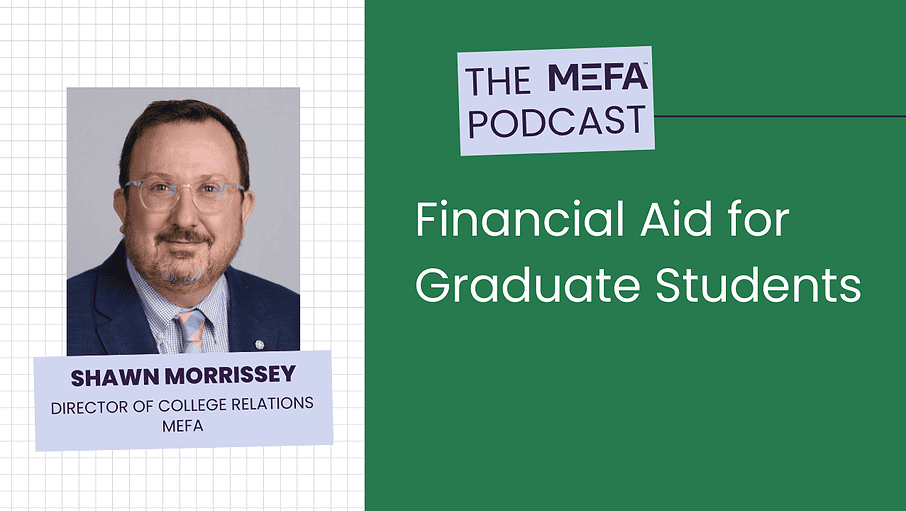

Resources Mentioned in this Episode
Jonathan Hughes: [00:00:00] Hi everyone, and welcome to the MEFA Podcast. My name is Jonathan Hughes.
Julie Shields-Rutyna: And I’m Julie Shields-Rutyna.
Jonathan Hughes: And we have a great show for you today. New MEFA team member Sean Morrissey is here. And he’s going to talk to us about graduate aid. That is financial aid for graduate students. Now, Sean is an expert on that topic.
So if you’re considering going to graduate school and you have questions about how to pay and what kind of aid exists for graduate students, you want to pay attention to that conversation later on in the show. But Julie, let’s talk about something else first. Shall we?
Julie Shields-Rutyna: Why don’t we, you know, we’re nearing the end of the year and near the end of the fall semester, and this means that we’ve been receiving a lot of calls from students about second semester loans. So why don’t we take this opportunity to answer some of those questions and give people an overview of that process.
Jonathan Hughes: Okay. So let’s start with the first question, which is, [00:01:00] you know, when would somebody be applying for a second loan in the middle of the year? Why would they be doing that?
Julie Shields-Rutyna: Yeah, so there may be a few reasons why someone would do that. First of all, you are right that the, when most families, when they take out a loan for the upcoming year they’ll do that at the end of the summer. They take out the loan for the full year, and then it gets dispersed half in the Fall and half in the Spring. That’s the most common way people borrow, but some don’t.
So some people, you know, are thinking about all the questions of maybe the student will take a leave from school or transfer, so they just decide I’m going to borrow for the Fall semester and see what things, what’s happening in the Spring, and I can borrow again for the spring. So for whatever reason, they might just feel more comfortable applying semester by semester.
So I’ll say this too, whether or not you apply for one semester at a time or the full year, it makes no difference in the cost to you. So the only difference is literally [00:02:00] two applications versus one application.
Jonathan Hughes: What’s the process like?
Julie Shields-Rutyna: Well, it’s the exact same as it was in the Fall. It’s the same process. So you go to mefa.org and you request your amount for the semester and you either list your school or if you’re transferring, you list a new school, and that’s important because you, there’s going to be a new credit. There’s going to be a credit check. So your credit does have to be approved again, and then you sign the MEFA loan agreement again, and the college has to certify your loan again. So it’s just the whole, all the steps for the same process. So where it could get complicated is that piece about whether or not you’re transferring to a new school or not. So just remember that all colleges have due dates. You know that they need to receive payment for the upcoming semester, so make sure you’re in contact with the financial aid office.
You [00:03:00] don’t want to get into a situation where you’re not able to register or you can’t move in. So oftentimes colleges will let you register or move in, even if you don’t have the money, but they know it’s on the way. So just be timely, complete your application and make sure the college is aware of what you’re doing, what the progress is with the loan.
Jonathan Hughes: Okay. And what about the last loan that you got? Anything you got to worry about there?
Julie Shields-Rutyna: Well, if you’re transferring colleges, you need to apply for a new loan to go to the new college. And what you also need to do is, is call MEFA to cancel any disbursements that are scheduled to go out in the Spring to your old school. So that’s, that’s key. A phone call should do it, but you just don’t want to have the loan funds go to your old college and then have to have the college send a refund. So if they don’t send it in time, interest may accrue on that loan. You might have to pay. So just take care of that.
Jonathan Hughes: [00:04:00] All right. Well, thank you, Julie. Now we’re going to head to our MEFA mail bag, and these are questions that have come into us over the past few weeks and answered by our college planning department. Now remember, if you have any questions about planning, saving, and paying for college or career readiness, you can reach out to us here at [email protected].
You can call us at 1-800-449-MEFA, or you can reach us on social media on Facebook. That’s @MEFAMA on Twitter that’s @MEFATweets and on Instagram that’s MEFA_MA. So today’s question comes to us from Jamie, who writes, my son has been getting student loans from Mifa and has an opportunity to study abroad Summer 2023. He would be earning course credit. Would he be able to get a loan for it? Julie?
Julie Shields-Rutyna: Yes. Well first I’ll say I love study abroad. Such a good opportunity for a student. So, you know, it really depends on the program. Many times, [00:05:00] often study abroad programs are through the college that the student is going to right now. And if that is the case, then. Then you’re paying the college, the tuition and all of that, and you would be able to take a MEA loan to pay for that. But you need to make sure of that that it’s through your, your college that your son is attending right now. If it isn’t if it’s through another college, I guess you could check with that college to make sure that they you know, have a federal code and that they can accept payment from federal loans and therefore MEFA loans.
So that would be the second check. And if it is just, Own separate program, you really need to talk to that, that school, because that may not be eligible for, you know, Federal financial aid or therefore a private loan. So let’s hope that many, [00:06:00] many study abroad. Opportunities are directly through the college that your, your son’s already, your son or daughters are going to. Let’s hope that it’s that scenario, but really what you need to do is talk to the financial aid office at the college.
Jonathan Hughes: All right. Well, thank you, Julie. I’ll say it again. If you have any questions, you can reach us via [email protected] over the phone at 1-800-449-MEFA. We have a bench of college guidance experts waiting to answer your question.
Now let’s go to my interview with MFA’s, director of College Relations, Sean Morrissey. Sean Morrisey has nearly 30 years of experience working in the financial aid. With stints at Mount Wachusett Community College, Framingham State University, and most importantly for our conversation today on graduate aid, he served as the Director of Financial Aid at the University of Massachusetts Medical School.
He joined me for just a few months ago in his role here. He works with [00:07:00] colleges and universities to amplify MEFA’s public service mission to help families to plan, save, and pay for college. I’ll also say that at the latest gathering of the Massachusetts Association of Student Financial Aid Administrators, he won the Charles Jack Sheen Award for distinguished service in the financial aid profession.
So, Sean, congratulations and welcome to the Mefa Podcast. Thank you, Jonathan. Happy to join you today. Did I get every, everything right in your resume? There?
Shawn Morrissey: You did
Jonathan Hughes: I’m glad. Well, it’s a long one and it’s an impressive one. So we’re of course very happy to have you here at me. We’re all very, very excited that you came aboard and I’m very excited once again to have you here. So just to make sort. Everyone aware generally what is the difference? We’re talking about graduate aid today, and when I say graduate aid, a lot of people who maybe are not at this point yet, or not at the point of college, and generally yet are not really sure what the difference is between [00:08:00] graduate and undergraduate school. So can you just start us off there?
Shawn Morrissey: Sure. So graduate school. Mostly you degree that you’re pursuing after you’ve already completed a bachelor’s degree. So once you’ve received your bachelor’s degree and you’re going on to graduate studies then you’re considered to be in graduate school. You could once you have a bachelor’s degree, go on and pursue another bachelor’s degree, then you still be an undergraduate. But if you’re going on to further your studies and get more in depth in the field than you’re considered a graduate student. And
Jonathan Hughes: So these are like master’s programs, is that right?
Shawn Morrissey: Yes. Master’s programs, professional programs, like if you’re going to medical school or law school, those are considered professional degrees. Master’s degrees doctoral degrees. Those are considered graduate studies.
Jonathan Hughes: And so at UMASS Medical School, I mentioned that was relevant for this conversation here. You were dealing pretty much exclusively with graduate students, is that right?
Shawn Morrissey: Yes. We were completely graduate only. We have nursing programs there [00:09:00] graduate school, biomedical sciences, and medical school. So we had several different degrees, but they were all graduate degrees.
Jonathan Hughes: So I’m pretty well versed in, in the field of undergraduate financial aid, but can you give us a sense of how that picture changes? When we get to the graduate level?
Shawn Morrissey: The big thing that changes when you get to the graduate level is federal aid. So anything. For federal grant aid, like the PELL grant program, the of the SFEOG program, those are not available unfortunately to graduate students. So and also any subsidized federal loans are not available to graduate students. So graduate students would have, for federal aid, the only thing they have available to them would be unsubsidized federal direct loans and grad plus loans which are taken out in their own name rather. The undergraduate loan is taken out in the parent’s name. Graduate students are able to take out plus loans in their own name because once [00:10:00] you complete your Bachelor’s degree and go onto graduate school, you are considered an independent student. And for most cases, you’re not reporting parental data any longer for the determination of your financial aid.
Jonathan Hughes: So if you’re an undergraduate student and you’re graduating and you’re considering going to graduate school, you need to file that FAFSA if you want financial aid, correct?
Shawn Morrissey: Yes. You do need to file the FAFSA still for graduate school. The process for applying for financial aid to grad school, it’s very similar, to undergrad. All the same forms are used. It’s just there are different types of aim that you’re eligible for. So a lot of grant aid especially federal and state grant aid is earmarked for undergraduate students, so you wouldn’t qualify for that but there are still institutional aid that’s available to graduate students so colleges, universities, they have institutional funding that they give to grad students to help with paying their education. [00:11:00] But federal and state grants usually are not available for, for graduate studies.
Jonathan Hughes: I’ll ask you a really basic question, which I just realized now I do not know the answer to. Is there such a thing as a graduate CSS Profile?
Shawn Morrissey: There’s what’s considered a graduate CSS profile, but some schools will require the CSS profile for determining institutional aid for graduate school purposes. For our medical school program at UMass Medical School, we did require the CSS profile form and also require parental data. Kind of contradicts what I just said where most students are considered independent for graduate school, but when it came to medical school purposes a lot of medical schools do collect parental data because in the case of medical school, which is different for most graduate degrees, medical students are pretty much working full-time as a student, [00:12:00] so they have no income while they’re in medical school. Most people that are pursuing a, a graduate degree do have a job on the side or have some time to do that. With medical school, it’s so intensive. There is no time to do that. So every student would look exactly the same. If we required only student information, they would. A zero income would all show full need. So in order to determine financial need for institutional aid, a lot of medical schools do collect parental data in order to determine that financial need, which is different than most graduate programs.
Jonathan Hughes: Well, that, that is sort of my next question and, and that is, you know, are there different types of aid available for different types of graduate program?
Shawn Morrissey: There are. So one of the things that’s available sometimes at the graduate school level would be fellowships or assistantships where you either work doing research, work as a teacher assistant, something like that while you’re in grad school that you get compensated [00:13:00] for. So sometimes that’s in the form of free tuition. Sometimes that’s in the form of a stipend that you actually get money to help with living expense. You can also use that towards tuition and fees. Sometimes you are working, doing research and you get both a tuition waiver and a stipend, so you actually can get paid to go to grad school in certain fields.
At the graduate school medical sciences at UMass Medical School, there was, there is a program that students pursuing, a PhD in research, do medical research in. Their degree is completely paid for no tuition or fee charges. Those are all waived for them. Plus they receive a stipend for a living expenses so that they can pay their rent, transportation, things like that as well. So it’s kind of, because you’re doing so much work as a researcher you’re, you’re pretty much at the same time, you’re pursuing your degree through learning how to do this research. You’re also providing [00:14:00] a service and doing a job that you’re, you’re compensated for. So there are some fields that that gap is available for students that’s not usually available on the undergraduate level, and it becomes a great way to get a degree low cost, or sometimes you can actually have an income on your, you’re pursuant your, your degree.
Jonathan Hughes: One thing I wasn’t as aware of was the, the availability in its sort of varieties from institutions.
Shawn Morrissey: Yeah. There’s definitely a, a lot of fields that, that, that is available for. And I don’t think as many students are aware of that, but that’s a, that’s an avenue that, that you can pursue. Especially in science fields, you’ll see that a lot. But it is available. And another avenue that students can pursue is looking through their employers. A lot of employers will help students with advanced degrees. So once you’ve already have your bachelor’s degree, you’re working in a certain field you want to [00:15:00] expand your education into a master’s degree or further, sometimes you could deem your employer will help you with some kind of either stipend that you can use to pay towards your school or they’ll reimburse you for classes that you’re taking. So that’s something you should always look into.
Jonathan Hughes: Now I wanna circle back to those loans just one more time. Could you talk about those particular programs? You mentioned the federal direct unsubsidized. I wonder if you could tell me what The student is able to borrow through those programs and what you mean by unsubsidized? Yes. And then the graduate plus as well.
Shawn Morrissey: Right, so the unsubsidized direct loan is a loan program through the federal government. That, and what unsubsidized means is that it does accrue interest. During school. So from the date of disbursement, that loan begins accruing interest. Whereas for undergraduate school, there are some subsidized loans that are available that the interest is deferred until you graduate [00:16:00] or leave school. With the non-subsidized loan, the interest is accruing from day one of disbursement and students are eligible to borrow for normal graduate programs, it’s about $20,500. Is the limit for the unsubsidized direct loan. If you’re going full-time. For medical school, those limits actually go up higher, so medical students are eligible to borrow up to about $47,000 a year in unsubsidized loans, which is something that, is available. Back in the day, there were some federal programs that were available only to medical students. Those programs were done away with, and what they did to replace those was to increase the loan limits available to medical students because their costs are usually pretty high for those loans. In addition to the unsubsidized loan, which is usually has those $20,500 caps students are eligible to borrow through the Grad [00:17:00] Plus Program and the Grad plus program, unlike the unsubsidized federal Direct loan program is a credit based loan, so you have to show credit worthiness in order to qualify for the grad plus loan. And then with that loan, you can borrow up to the cost of education less any other financial aid that you have. So you, you can Borrow the full cost of education through the grad plus loan if you need to, as long as you’re credit worthy. If you yourself are not quite credit worthy, you can have a close sign on that loan to help you with that if you need to. And this differs again from undergrad where the plus loan borrowing for undergrad is done by the parents for graduate school. The grad plus loan is in the student’s name themselves. Unless they need a cosigner, then. Sometimes you can go to your parent or another relative friend too to cosign that if you need to.
Jonathan Hughes: Now I wanna talk for a minute about outside scholarships. This is something that we [00:18:00] know is on top of mind for a lot of undergraduate students or incoming undergraduate students. Are there scholarships available for graduate programs and in your experience, you know, are, are they used by students very often?
Shawn Morrissey: There are many outside scholarships that are available to graduate students. I don’t think graduate students are often as aware of them as undergraduate students because a lot of the undergraduate outside scholarships become available through your guidance office at your high school, things like that. So they’re, they’re readily available to you. I think the ones for graduate students, you have to be a little bit more proactive. Search for those through online search engines, things like that. But the great thing about graduate school where you’re really focused on your studies, you can look for certain scholarships that would be available to that field that you’re studying in.
We saw a lot of scholarships come through at, [00:19:00] at UMass Medical for, for students especially in the science fields, and that’s what we dealt with. So that’s probably why I saw a lot of those. But there seems to be a lot of outside scholarships available for students that wanted to advance studies in the sciences, but I’m sure they’re available in all of the different programs that people want to pursue.
Jonathan Hughes: No, it’s good to know. You know, we talked a moment ago about loans and about the difference between some undergraduate and graduate loans for students who are coming out of undergraduate school and considering graduate school. What should they know about any existing loans that they may have before for, for undergraduate school that they, that they need to know before they make the decision to attend graduate school?
Shawn Morrissey: So students should really look at what loans they do have, what their loan portfolio looks like. If you have federal loans, usually you can defer those loans as long as you’re at least halftime in a degree program. And that is true for graduate [00:20:00] programs as well. So as long as. Enrolled in a degree program, those loans should be deferred no matter how long the program is. For private loans, you have to look closely at those to see what the limits are on the deferments for those, sometimes they have a four year deferment maximum, so you want to take a look at those to see if the program that you plan to study allows for deferment for graduate school, and if it does, if there’s a maximum on that. I saw a lot of students that came into medical school and oftentimes a medical school degree is for four years it is the norm for that. But sometimes it took longer if a student wanted to specialize in a really difficult specialty that might take longer than four years for them to complete that degree. And they ran into trouble where they had a private loan for undergrad that was then going into repayment and they have no income, so they have no way to repay that at that point because they’re, they’re in [00:21:00] school full-time. So sometimes they would have to either refinance that loan. Or call up the service over belongs to see if there’s any way to extend that deferment. In some cases, there wasn’t any way to, to extend that, and the only option would be to refinance that loan or to, if they had some room to borrow additional grad plus loan or something like that, to, use that to make payments in the short term while they were getting through that. We tried not to recommend students to take another loan to pay off a prior loan, but refinancing was usually the best option for them if that was available to them.
Jonathan Hughes: So if you were speaking with someone who is. Thinking about going to graduate school. They’ve got their undergraduate degree but they’re concerned about, you know, they have questions really about how they’re gonna pay for it. I don’t, my, my sister is thinking about graduate school right now and she’s sort of figuring out what programs are available what advice, where should they get started?
Shawn Morrissey: What they should first do is [00:22:00] contact the financial aid office, that schools that they’re planning to attend, see what might be available at that particular school because each school. Different funding that may be available for those programs that no one else would may know about, so that that would be the first source to do. The other thing I would recommend is contacting your human resources office, where if you are employed currently, to see if they have any education benefits available to help pay with pay for your school as well. And then again, I would take a look at what you already have for a loan portfolio, if you have undergraduate loans to make sure that you have all of that, that information readily available to you to know that if you have to put those loans into deferment or if you’re going to have to still make payments on those loans, if that’s going to be affordable for you, once you add additional loans to that possibly, or if you’re reducing your hours of work to pursue your degree, if you’re still able to make those [00:23:00] loan payments for undergraduate.
Jonathan Hughes: When would you say, what, what factors would you consider that someone should consider when they’re trying to figure out if a graduate program would be a good investment for them?
Shawn Morrissey: Well, it’s that’s something that I think is individual to everyone, so it depends what your end result is. If you just want to gain knowledge in something, which some people love the pursuit of, of knowing more in a field or things like that. Then you have to look at what the value of that is to yourself and to see if that’s something you can afford. If your goal is to have a higher income and to better your yourself that way through a graduate degree, then you could do a cost analysis. See, you know, how much is it going to cost me for this? Over my lifetime of earnings, how much is the potential that I could [00:24:00] increase my income by having, by having this degree and, do a cost analysis there to see if the amount that you’re paying for that education is, worth your investment. In most cases in a lot of fields, if you look at graduate degree and potential earnings, the return on investment it is really good on pursuing advanced degrees, but in some fields, unfortunately, you don’t get that return on investment, but it may still be worth it to you individually if it’s a passion of yours that you wanna pursue. If the knowledge that you’re gaining through that advanced degree is worth it to you. So you just have to ask that question of yourself.
Jonathan Hughes: Well, Sean, thank you very much. I learned a lot about graduate aid talking to you right now, so I can imagine others will as well. But it was great to have you in the show and thank you so much for coming by.
Shawn Morrissey: Thank you, Jonathan. Anytime you need to talk to me, I’m happy to be here.[00:25:00]
Jonathan Hughes: All right folks. Well, that about wraps it up for us. I want to thank Sean Morrisy for sharing his time and his expertise with us. And again, welcome to MEFA Sean, and if you liked what you heard today and you wanna know more about planning, saving, and paying for college and career readiness, well you can follow the show on Apple Podcasts, Spotify, Stitcher, wherever you get your podcasts. Then please remember to review us. It helps us to keep doing what we are doing, getting this show out to folks like. Julie, once again, it was a pleasure. Thank you.
Julie Shields-Rutyna: Thank you, John.
Jonathan Hughes: And I want to thank Shaun Connolly, our producer and AJ Yee for his assistance in posting the show. Once again, my name is Jonathan Hughes and this has been the MEFA Podcast.













